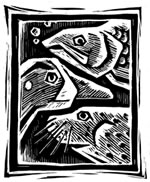- Home
- Restoration Projects
- Project Search
- SEA: PWS System Investigation: Experimental Manipulation 94320-L
Project Information
Title: SEA: PWS System Investigation: Experimental Manipulation 94320-L
Project Year and Number: 1994: 94320-L
Other Fiscal Years and Numbers for this Project: None
Principal Investigator (PI): Jeff Olsen (U.S. Fish and Wildlife Service)
Managing Agency: ADFG
Assisting Personnel: Howard Ferren, Curt Kerns
Research Location: Prince William Sound
Restoration Category: Research
Injured Resources Addressed: Pink Salmon
Abstract: This project is a component of the Sound Ecosystem Assessment (SEA) program, a multi-disciplinary effort to acquire an ecosystem level understanding of the marine and freshwater processes that interact to constrain levels of fish, marine bird, and marine mammal production in Prince William Sound (PWS). Pink salmon are thought to play an important role in the survival of other fishes, birds and mammals. The SEA program advocates that experimental releases of hatchery pink salmon juveniles will provide a powerful test of the influence of ocean-entry timing and of fry size at ocean entry on losses to predators. By using hatchery pink salmon, important variables such as release timing, release location, number of fry released, fry age, and fry size can be controlled. Coded wire tags applied to hatchery fish provide a mechanism for making assessments of early marine growth, life stage mortality, and migration patterns. Approximately 371 million coded-wire tagged hatchery pink fry will be reared and released from three different hatcheries in PWS. Fry will be released in varying group sizes when they have attained a weight of approximately .25-.35 grams. Near shore plankton abundance will be monitored and sampled for relative density and species identification.Proposal: Not Available
Reports:
Final Report: View (438 KB)
Publications from this Project: None Available
